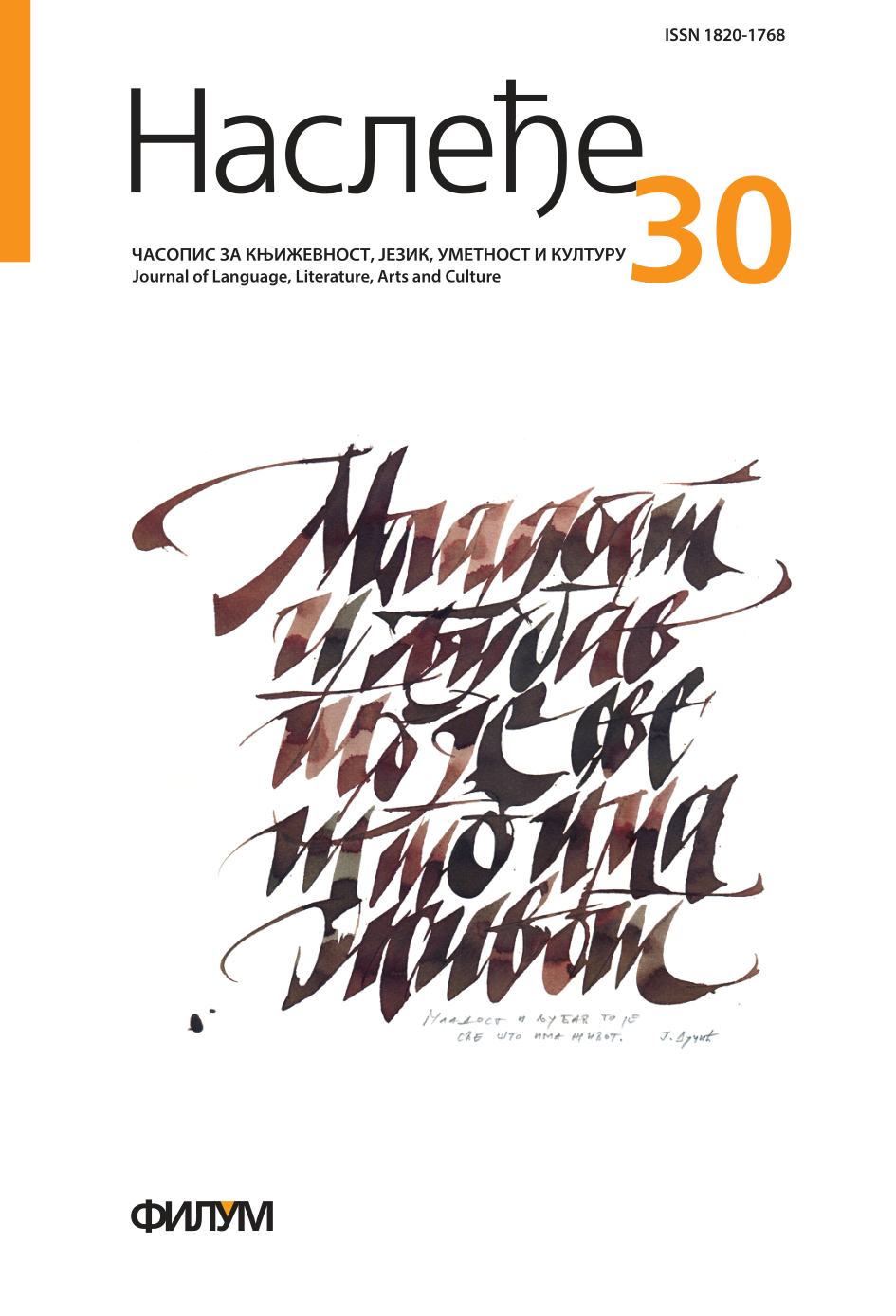THE ROLE OF EMPATHY IN TEACHING FOREIGN LANGUAGES AND DEVELOPMENT OF INTERCULTURAL COMPETENCE
Keywords:
empathy, emotions, second language teaching, intercultural competence, teacher’s roleAbstract
The paper examines the way in which the current research within the field of methods of teaching foreign languages has discussed the topic of the importance of empathy in the process of foreign language acquisition. It points to the aspect and volume of the analyzed papers and their contribution to the research within this field. The aim of the paper is to cover as much as possible research on empathy and emphasize the importance of this type of affective aspects of personality in the field of learning and acquisition of foreign languages. It starts from the premise that it is necessary to know your own feelings in order to fully comprehend the thoughts and feelings of the person with whom you come into direct contact. The analysis shows a correlation between empathy and correct pronunciation, as well as a connection with the development of intercultural competence, which is highly influential in the process of acquiring foreign languages. The paper refers to the importance of the atmosphere in the classroom and the teacher's role in foreign language acquisition, as well as the influence of teachers on the development of certain forms of empathy and intercultural competence in students. It is necessary to encourage students and foster mutual understanding, respect, openness to the new and different. It can be concluded that there is a lack of research on the correlation between empathy and teaching foreign languages, which can be a subject of future research.
References
Arnold 1999: J. Arnold, Affect in language learning, Cambridge: Cambridge University Press.
Baron Koen 2012: S. Baron Koen, Psihologija zla, Beograd: Clio.
Braun 2000: D. Brown, Principles of language learning and teaching, White Plains: Pearson Education Company.
Bugarski 1996: R. Bugarski, Jezici, Novi Sad: Matica srpska. [orig.]
Бугарски 1996: Р. Бугарски, Језици, Нови Сад: Матица српска.
Filipović 2009: J. Filipović, Moć reči: Ogledi iz kritičke sociolingvistike, Beograd: Zadužbina Andrejević
Fonkubjerta Muriel 2015: J. M. Foncubierta Muriel, Comunicación intercultural: creencias, valores y actitudes en la enseñanza del español, http://www.academia.edu/10450977/Comunicaci%C3%B3n_intercultural_creencias_valores_y_actitudes_en_la_ense%C3%B1anza_del_espa%C3%B1ol. 4. 2. 2015.
Giora 1972: A. Guiora, Construct validity and transpositional research: Toward an empirical study of psychoanalytic concepts, http://deepblue.lib.umich.edu/bitstream/handle/2027.42/34141/0000426.pdf?sequence=1. 10. 5. 2014.
Goleman 2013: D. Goleman, Emocionalna inteligencija, Beograd: Geopoetika izdavaštvo.
Gud, Foks i Kofen 2011: J. Good, Ј. Fox, R. Coffen, Fostering the development of empathy in the classroom, http://research.avondale.edu.au/cgi/viewcontent.cgi?article=1055&context=teach.10. 2. 2014.
Krašen 1981: S. Krashen, Second language acquisition and second language learning, London: Pergamon Press Inc.
Kuper 2004: B. Cooper, Empathy, interaction and caring: Teachers’ roles in a constrained environment,https://www.google.rs/url?sa=t&rct=j&q=&esrc=s&source=web&cd=5&cad=rja&ved=0CFcQFjAE&url=http%3A%2F%2Fwww.researchgate.net%2Fpublication%2F29439913_Empathy_interaction_and_caring_Teachers%27_roles_in_a_constrained_environment%2Ffile%2F9c96051dbb75f6a6f7.pdf&ei=GXIGU4SjJsjoswaRo4HICQ&usg=AFQjCNFviZwmkESgvt3DuP8lnlJd2WZhGw. 16. 3. 2014.
Marandon 2003: G. Marandon, Más allá de la empatía, hay que cultivar la confianza: Claves para el reencuentro intercultural, http://www.raco.cat/index.php/revistacidob/article/viewFile/28303/28137. 10. 1. 2014.
Mekalister i Džordan Irvin 2002: G. McAllister, J. Jordan Irvine, The role of empathy in teaching culturally diverse students, http://www33.homepage.villanova.edu/edward.fierros/pdf/McAllister%20Irvine%20Content.pdf. 10. 1. 2014.
Olivares 2012: G. Olivares, Does empathy make a difference in foreign language classroom, http://www.revistahumanidades.uda.cl/publica/050008.pdf. 16. 3. 2014.
Rodžers i Skot 2008: C. Rodgers, K. Scott, The development of the personal self and professional identity in learning to teach, https://www.academia.edu/1879050/The_development_of_the_personal_self_and_professional_identity_in_learning_to_teach. 20. 1. 2014.
Rozenberg 2002: M. Rozenberg, Jezik saosećanja, Beograd: Zavod za udžbenike i nastavna sredstva
Sinikrop, Noris, Vatanabe 2007: C. Sinicrope, J. Norris, Y. Watanabe, Understanding and assesing intercultural competence: a summary of theory, research, and practice (technical report for the foreign language evaluation project), http://www.hawaii.edu/sls/uhwpesl/26(1)/Norris.pdf. 10. 2. 2014.
Tejlor, Giora, Ketford, Lejn 1969: L. Taylor, A. Guiora, J. Catford, H. Lane, The role of personality variables in second language behavior, http://deepblue.lib.umich.edu/bitstream/handle/2027.42/32874/0000252.pdf?sequence=1. 10. 5. 2014.
Vilotijević 2000: M. Vilotijević, Didaktika. Organizacija nastave, Beograd: Zavod za udžbenike i nastavna sredstva. [orig.]
Вилотијевић 2000: М. Вилотијевић, Дидактика. Организација наставе,
Београд: Завод за уџбенике и наставна средства.
Zu 2011: H. Zhu, From intercultural awareness to intercultural empathy, http://www.ccsenet.org/journal/index.php/elt/article/viewFile/9671/6919. 23. 4. 2014.






